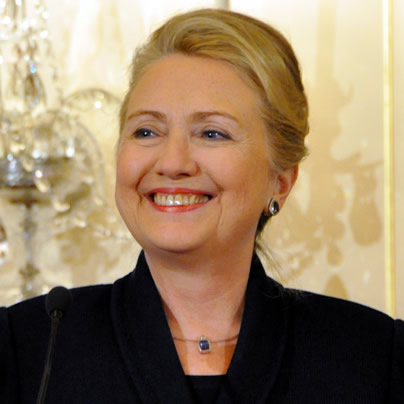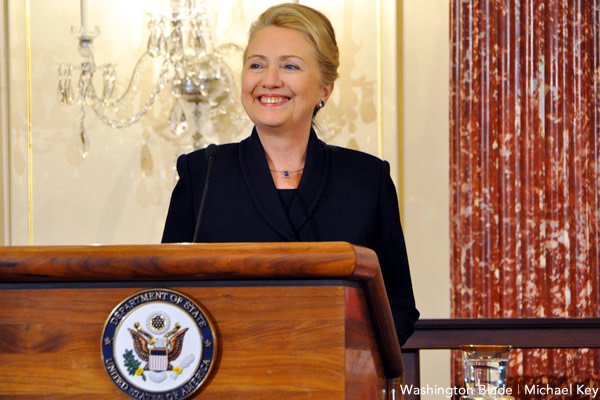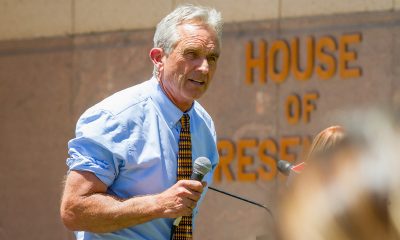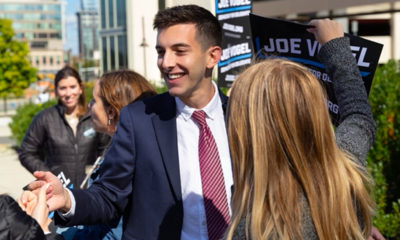National
Clinton: LGBT-inclusion ‘the smart thing’ for U.S. foreign policy
Secretary speaks before LGBT Foreign Service officers

Secretary of State Hillary Clinton delivered on Wednesday what might be her last public address before an LGBT audience as chief diplomat for the United States when she told group of LGBT Foreign Service officers their service is integral to the country.
“Creating an LGBT-welcoming workplace is not just the right thing to do, it’s also the smart thing,” Clinton said. “And part of that is because the nature of diplomacy has changed and we should and need to keep up. Today, we expect our diplomats to build relationships not just with their counterparts in foreign governments, but from people from every continent and every walk of life, and, in order to do that, we need a diplomatic core that is as diverse as the world we work in.”
Additionally, Clinton said having an LGBT-inclusive State Department makes the Foreign Service corps “better advocates” for American values.
“When anyone is persecuted anywhere and that includes when LGBT people are persecuted, we’re kept from fully participating in their societies,” Clinton said. “They suffer, but so do we. We are diminished because our commitment to the human rights of all people has to be a continuing obligation and mission of everyone who serves in the government of the United States.”
Clinton delivered the remarks in Benjamin Franklin room at the State Department to observe the 20th anniversary of the department’s LGBT affinity group, Gays & Lesbians in Foreign Affairs Agencies, or GLIFAA.
She reminded the estimated 200 people in attendance that world in which GLIFAA was created was much different than today and the organization has worked over the course of 20 years to create a fairer workplace for LGBT Foreign Service officers.
“As we heard, in 1992, you could be fired for being gay,” Clinton said. “Just think about all of the exceptional public servant — the brilliant strategists, the linguists, the experts — fired for no reason other than their sexual orientation. Think of what we lost because we were unable of their hard work, expertise and experience.”
Clinton also gave recognition to Tom Gallagher, whom she said joined the State Department in 1965 and in the early 1970’s became the first openly gay Foreign Service officer. He was in the audience during Clinton’s speech and rose when the secretary mentioned him.
“He served in the face of criticism and threats, but that did not stop him from serving,” Clinton said. “I want to take this moment just to recognize him, but also to put into context what this journey has meant for people for people of Tom and my generation because I don’t want any of you who are younger ever to take for granted what it took for people like Tom Gallagher to pave the way for all of you. It is not a moment for us to be nostaglic; it is a way for us to remember.”
The speech occurs almost one year after Clinton gave a high-profile speech in Geneva in favor of LGBT human rights, telling LGBT people that face human rights abuses overseas they “have an ally in the United States of America.” Clinton noted her speech from the previous year during her remarks at the State Department.
“When I gave that speech in Geneva and said we were going to make this a priority for American foreign policy, I didn’t see it as something special, something that was added on to everything else we do, but something that was integral to who we are and what we stand for,” Clinton said.
Toby Quaranta, who’s gay and president of the D.C Young Democrats, was among those in attendance and said the speech was “an example of why she is such a popular secretary of state.”
“She wants to make advances for LGBT people not just as a way to advance the cause of human rights, but also as a way to advance American interests abroad,” Quaranta said. “It’s a moral issue with a pragmatic end. That’s her way of doing business, and that is why she has been so successful as secretary of state.”
No new announcements were made during the State Department address, but the event was geared toward thanking those present as opposed to addressing policy issues.
Clinton gave no update during the speech on where she stands on marriage equality. She remains one of the few high-profile Democrats who’s yet to publicly endorse same-sex marriage and has remained silent in the issue even after her employer President Obama came out for marriage equality in May.
Also absent from Clinton’s speech was any mention of anti-gay legislation in Uganda that’s received considerable international attention out of fears the bill may soon be headed toward passage. It would institute a sentence of life in prison for homosexuality acts and possibly the death penalty.
But Clinton did tout the LGBT achievements the State Department has made under her watch. Among them are extending benefits to the same-sex partners of Foreign Service officers. On transgender issues, the department instituted policy against workplace discrimination for transgender employees and eased the process to allow transgender Americans to change the gender marker on their passports.
“Together we have worked to make something very simple and right come true: Our people should not have to choose between serving the country they love and sharing a life with the people with they love,” Clinton said.
Cheryl Mills, Clinton’s chief of staff and a long-time adviser who worked on her 2008 presidential campaign, also commended those present as she said her boss seeks to ensure each person across the globe can “live up to his or her God-given potential.”
“That principle is a very simple one, but its implementation too often requires courage and persistence, relentlessness and willingness to actual do something when doing nothing is absolutely the easiest course of action,” Mills said. “Those who have been part of and stayed with GLIFAA, they have always managed to do something, and the work that you all have done together has brought the change that we have seen in the department.”
Clinton has indicated that she intends to step down as secretary of state after the conclusion of Obama’s first term. Speculation persists that she may pursue that Democratic nomination for the presidency when Obama completes his second and final term in 2016, although she hasn’t stated she’d run.
Lane Hudson, a gay Democratic activist and outspoken Clinton supporter, said he expects her to maintain a strong relationship with the LGBT community whatever her course of action she pursues after she leaves the State Department.
“Given her long history with the LGBT community and her exemplary record on issues of equality at the State Department, I fully expect there to be a meaningful ongoing relationship between her and the community, whether she pursues the presidency or continues to advocate for equality for all as a private citizen,” Hudson said.
Others who spoke before the audience were GLIFAA President Ken Kero-Mentz, USAID Deputy Administrator Donald Steinberg, and Daniel Baer, who’s gay and deputy assistant secretary of state for the Bureau of Democracy, Human Rights & Labor.
Notable members of the LGBT community who were in the audience included U.S. ambassador to New Zealand David Huebner, former U.S. ambassador to Romania Michael Guest, Human Rights Campaign President Chad Griffin, White House LGBT liaison Gautam Raghavan and Amanda Simpson, who was first openly transgender woman political appointee in any U.S. administration.
NOTE: This article has been updated to include a statement from Toby Quaranta.
Federal Government
Lambda Legal praises Biden-Harris administration’s finalized Title IX regulations
New rules to take effect Aug. 1

The Biden-Harris administration’s revised Title IX policy “protects LGBTQ+ students from discrimination and other abuse,” Lambda Legal said in a statement praising the U.S. Department of Education’s issuance of the final rule on Friday.
Slated to take effect on Aug. 1, the new regulations constitute an expansion of the 1972 Title IX civil rights law, which prohibits sex-based discrimination in education programs that receive federal funding.
Pursuant to the U.S. Supreme Court’s ruling in the landmark 2020 Bostock v. Clayton County case, the department’s revised policy clarifies that discrimination on the basis of sexual orientation and gender identity constitutes sex-based discrimination as defined under the law.
“These regulations make it crystal clear that everyone can access schools that are safe, welcoming and that respect their rights,” Education Secretary Miguel Cardona said during a call with reporters on Thursday.
While the new rule does not provide guidance on whether schools must allow transgender students to play on sports teams corresponding with their gender identity to comply with Title IX, the question is addressed in a separate rule proposed by the agency in April.
The administration’s new policy also reverses some Trump-era Title IX rules governing how schools must respond to reports of sexual harassment and sexual assault, which were widely seen as imbalanced in favor of the accused.
Jennifer Klein, the director of the White House Gender Policy Council, said during Thursday’s call that the department sought to strike a balance with respect to these issues, “reaffirming our longstanding commitment to fundamental fairness.”
“We applaud the Biden administration’s action to rescind the legally unsound, cruel, and dangerous sexual harassment and assault rule of the previous administration,” Lambda Legal Nonbinary and Transgender Rights Project Director Sasha Buchert said in the group’s statement on Friday.
“Today’s rule instead appropriately underscores that Title IX’s civil rights protections clearly cover LGBTQ+ students, as well as survivors and pregnant and parenting students across race and gender identity,” she said. “Schools must be places where students can learn and thrive free of harassment, discrimination, and other abuse.”
Michigan
Mich. Democrats spar over LGBTQ-inclusive hate crimes law
Lawmakers disagree on just what kind of statute to pass

Michigan could soon become the latest state to pass an LGBTQ-inclusive hate crime law, but the state’s Democratic lawmakers disagree on just what kind of law they should pass.
Currently, Michigan’s Ethnic Intimidation Act only offers limited protections to victims of crime motivated by their “race, color, religion, gender, or national origin.” Bills proposed by Democratic lawmakers expand the list to include “actual or perceived race, color, religion, gender, sexual orientation, gender identity or expression, ethnicity, physical or mental disability, age, national origin, or association or affiliation with any such individuals.”
Democratic Gov. Gretchen Whitmer and Attorney General Dana Nessel have both advocated for a hate crime law, but house and senate Democrats have each passed different hate crimes packages, and Nessel has blasted both as being too weak.
Under the house proposal that passed last year (House Bill 4474), a first offense would be punishable with a $2,000 fine, up to two years in prison, or both. Penalties double for a second offense, and if a gun or other dangerous weapons is involved, the maximum penalty is six years in prison and a fine of $7,500.
But that proposal stalled when it reached the senate, after far-right news outlets and Fox News reported misinformation that the bill only protected LGBTQ people and would make misgendering a trans person a crime. State Rep. Noah Arbit, the bill’s sponsor, was also made the subject of a recall effort, which ultimately failed.
Arbit submitted a new version of the bill (House Bill 5288) that added sections clarifying that misgendering a person, “intentionally or unintentionally” is not a hate crime, although the latest version (House Bill 5400) of the bill omits this language.
That bill has since stalled in a house committee, in part because the Democrats lost their house majority last November, when two Democratic representatives resigned after being elected mayors. The Democrats regained their house majority last night by winning two special elections.
Meanwhile, the senate passed a different package of hate crime bills sponsored by state Sen. Sylvia Santana (Senate Bill 600) in March that includes much lighter sentences, as well as a clause ensuring that misgendering a person is not a hate crime.
Under the senate bill, if the first offense is only a threat, it would be a misdemeanor punishable by one year in prison and up to $1,000 fine. A subsequent offense or first violent hate crime, including stalking, would be a felony that attracts double the punishment.
Multiple calls and emails from the Washington Blade to both Arbit and Santana requesting comment on the bills for this story went unanswered.
The attorney general’s office sent a statement to the Blade supporting stronger hate crime legislation.
“As a career prosecutor, [Nessel] has seen firsthand how the state’s weak Ethnic Intimidation Act (not updated since the late 1980’s) does not allow for meaningful law enforcement and court intervention before threats become violent and deadly, nor does it consider significant bases for bias. It is our hope that the legislature will pass robust, much-needed updates to this statute,” the statement says.
But Nessel, who has herself been the victim of racially motivated threats, has also blasted all of the bills presented by Democrats as not going far enough.
“Two years is nothing … Why not just give them a parking ticket?” Nessel told Bridge Michigan.
Nessel blames a bizarre alliance far-right and far-left forces that have doomed tougher laws.
“You have this confluence of forces on the far right … this insistence that the First Amendment protects this language, or that the Second Amendment protects the ability to possess firearms under almost any and all circumstances,” Nessel said. “But then you also have the far left that argues basically no one should go to jail or prison for any offense ever.”
The legislature did manage to pass an “institutional desecration” law last year that penalizes hate-motivated vandalism to churches, schools, museums, and community centers, and is LGBTQ-inclusive.
According to data from the U.S. Department of Justice, reported hate crime incidents have been skyrocketing, with attacks motivated by sexual orientation surging by 70 percent from 2020 to 2022, the last year for which data is available.
Twenty-two states, D.C., Puerto Rico, and the U.S. Virgin Islands have passed LGBTQ-inclusive hate crime laws. Another 11 states have hate crime laws that include protections for “sexual orientation” but not “gender identity.”
Michigan Democrats have advanced several key LGBTQ rights priorities since they took unified control of the legislature in 2023. A long-stalled comprehensive anti-discrimination law was passed last year, as did a conversion therapy ban. Last month the legislature updated family law to make surrogacy easier for all couples, including same-sex couples.
A bill to ban the “gay panic” defense has passed the state house and was due for a Senate committee hearing on Wednesday.
Indiana
Drag queen announces run for mayor of Ind. city
Branden Blaettne seeking Fort Wayne’s top office

In a Facebook post Tuesday, a local drag personality announced he was running for the office of mayor once held by the late Fort Wayne Mayor Tom Henry, who died last month just a few months into his fifth term.
Henry was recently diagnosed with late-stage stomach cancer and experienced an emergency that landed him in hospice care. He died shortly after.
WPTA, a local television station, reported that Fort Wayne resident Branden Blaettne, whose drag name is Della Licious, confirmed he filed paperwork to be one of the candidates seeking to finish out the fifth term of the late mayor.
Blaettner, who is a community organizer, told WPTA he doesn’t want to “get Fort Wayne back on track,” but rather keep the momentum started by Henry going while giving a platform to the disenfranchised groups in the community. Blaettner said he doesn’t think his local fame as a drag queen will hold him back.
“It’s easy to have a platform when you wear platform heels,” Blaettner told WPTA. “The status quo has left a lot of people out in the cold — both figuratively and literally,” Blaettner added.

The Indiana Capital Chronicle reported that state Rep. Phil GiaQuinta, who has led the Indiana House Democratic caucus since 2018, has added his name to a growing list of Fort Wayne politicos who want to be the city’s next mayor. A caucus of precinct committee persons will choose the new mayor.
According to the Fort Wayne Journal Gazette, the deadline for residents to file candidacy was 10:30 a.m. on Wednesday. A town hall with the candidates is scheduled for 6 p.m. on Thursday at Franklin School Park. The caucus is set for 10:30 a.m. on April 20 at the Lincoln Financial Event Center at Parkview Field.
At least six candidates so far have announced they will run in the caucus. They include Branden Blaettne, GiaQuinta, City Councilwoman Michelle Chambers, City Councilwoman Sharon Tucker, former city- and county-council candidate Palermo Galindo, and 2023 Democratic primary mayoral candidate Jorge Fernandez.
-

 Africa5 days ago
Africa5 days agoCongolese lawmaker introduces anti-homosexuality bill
-

 District of Columbia1 day ago
District of Columbia1 day agoReenactment of first gay rights picket at White House draws interest of tourists
-

 World5 days ago
World5 days agoOut in the World: LGBTQ news from Europe and Asia
-

 Arizona2 days ago
Arizona2 days agoAriz. governor vetoes anti-transgender, Ten Commandments bill













